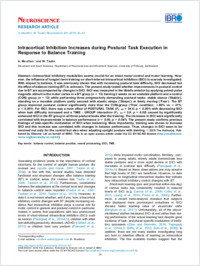Intracortical inhibition increases during postural task execution in response to balance training
- Mouthon, Audrey Movement and Sport Sciences, Department of Neurosciences and Movement Sciences, University of Fribourg, Switzerland
- Taube, Wolfgang Movement and Sport Sciences, Department of Neurosciences and Movement Sciences, University of Fribourg, Switzerland
-
01.03.2019
Published in:
- Neuroscience. - 2019, vol. 401, p. 35–42
English
Intracortical inhibitory modulation seems crucial for an intact motor control and motor learning. However, the influence of long(er) term training on short-interval intracortical inhibition (SICI) is scarcely investigated. With respect to balance, it was previously shown that with increasing postural task difficulty, SICI decreased but the effect of balance training (BT) is unknown. The present study tested whether improvements in postural control due to BT are accompanied by changes in SICI. SICI was measured in the tibialis anterior by applying paired-pulse magnetic stimuli to the motor cortex in a BT group (n = 13) training 2 weeks on an unstable platform and a control (CON) group (n = 13) while performing three progressively demanding postural tasks: stable stance (‘Stable’), standing on a movable platform partly secured with elastic straps (‘Straps’) or freely moving (‘Free’). The BT group improved postural control significantly more than the CON-group (‘Free’ condition: +80% vs. + 21%; p < 0.001). For SICI, there was a main effect of POSTURAL TASK (F2, 48 = 24.6; p < 0.001) with decreasing SICI when task difficulty increased and a TIME × GROUP interaction (F1, 24 = 5.9; p = 0.02) caused by significantly enhanced SICI in the BT group in all three postural tasks after the training. The increases in SICI were significantly correlated with improvements in balance performance (r = 0.56; p = 0.047). The present study confirms previous findings of task-specific modulation of SICI when balancing. More importantly, training was shown to increase SICI and this increase was correlated with changes in balance performance. Thus, changes in SICI seem to be involved not only for the control but also when adapting upright posture with training.
- Faculty
- Faculté des sciences et de médecine
- Department
- Département de Médecine
- Language
-
- English
- Classification
- Biological sciences
- License
-
License undefined
- Identifiers
-
- RERO DOC 324355
- DOI 10.1016/j.neuroscience.2019.01.007
- Persistent URL
- https://folia.unifr.ch/unifr/documents/307645
Statistics
Document views: 171
File downloads:
- pdf: 208
